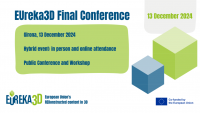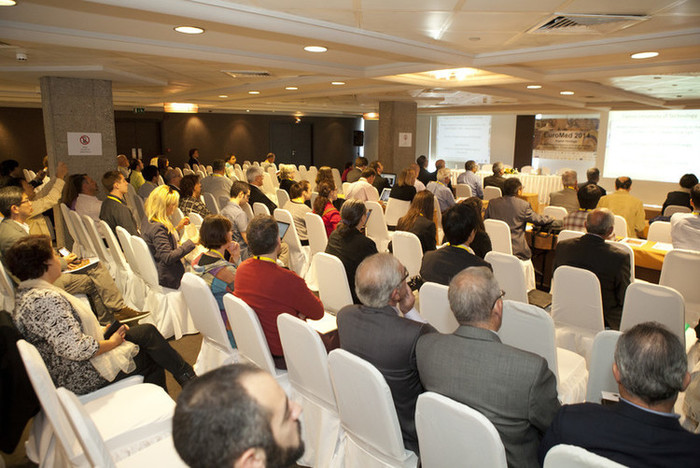
The audience of Euromed 2014 congress
The 5th International Euro-Mediterranean Conference (EuroMed 2014), devoted to Cultural Heritage (CH), was held on the 3rd-8th of November at the entrance of the ancient Amathus city, by Limassol, in Cyprus island. The EuroMed2014 is under the Patronage of H. E. the President of the Republic of Cyprus, Mr. Nikos Anastasiades.
Conference proceedings and nice photos of the event are available via the congress’ official website: www.euromed2014.eu
EuroMed brings together researchers, policy makers, professionals and practitioners to explore some of the more pressing issues concerning cultural heritage today.
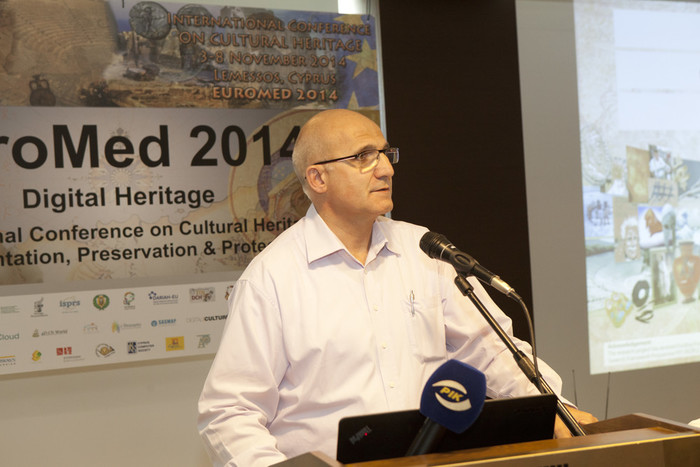
Dr. Marinos Ioannides opening the event
The Conference Chair dr. Marinos Ioannides, announcing the event, said: “The ultimate aim of the 5th EuroMed conference will be to bring together as many stakeholders as possible from different backgrounds in order to achieve a high level of mutual understanding of the needs, the requirements and the technical means of meeting them. Therefore, our common goal is to focus on interdisciplinary and multi-disciplinary research on tangible and intangible Cultural Heritage, the use of cutting edge technologies for the protection, preservation, conservation, massive digitalisation and visualization/presentation of the Cultural Heritage content (archeological sites, artifacts, monuments, libraries, archives, museums, etc). At the same time, the event is intended to cover topics of research ready for exploitation, demonstrating the acceptability of new sustainable approaches and new technologies by the user community, SME’s, owners, managers and conservators of cultural patrimony.”
E-Agenda of the Conference (PDF 214 Kb)
Main objectives of the conference were:
• highlighting the role of European CH research within international activities and cooperation;
• assessing the impact of EU policies on European CH and evaluating the positive contribution of CH innovative research to competitiveness and job creation;
• disseminating the results of European CH innovative research and discussing new possible developments;
• discussing coordination of national research within educational programmes for CH in Europe and the world;
• refining, amending and publishing main ideas of any technological platforms opened to the entire field of CH, in the context of preparation of 2016/17’s Work Programme for the EU Horizon2020 FP (2014-2020);
• emphasizing the relation of conservation practice to contemporary legislation, especially experienced by SMEs and especially as regards problems of orphan works, fraud and crime in the movable cultural heritage market, health and safety issues;
• evaluating how research influenced the impact of EU policies on CH and discussing the mitigation of possible adverse effects;
• underlining and discussing the role of current and future developments in international activities, agreements and cooperation:
a) against demolishing and/or looting in CH;
b) on the e-documentation and e-preservation in CH;
c) on the establishment of standards in the field of CH;
d) on conventions (like UNESCO Convention for the Safeguarding of Intangible CH);
e) on documenting, archiving, monitoring, preserving, protecting and presenting CH worldwide using innovative ICT solutions;
f) on the legal and ethical responsibilities of CH Informatics.

For more information: www.euromed2014.eu



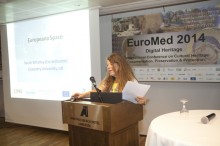
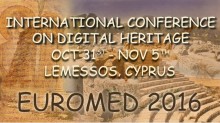

 If you have interesting news and events to point out in the field of digital cultural heritage, we are waiting for your contribution.
If you have interesting news and events to point out in the field of digital cultural heritage, we are waiting for your contribution.










